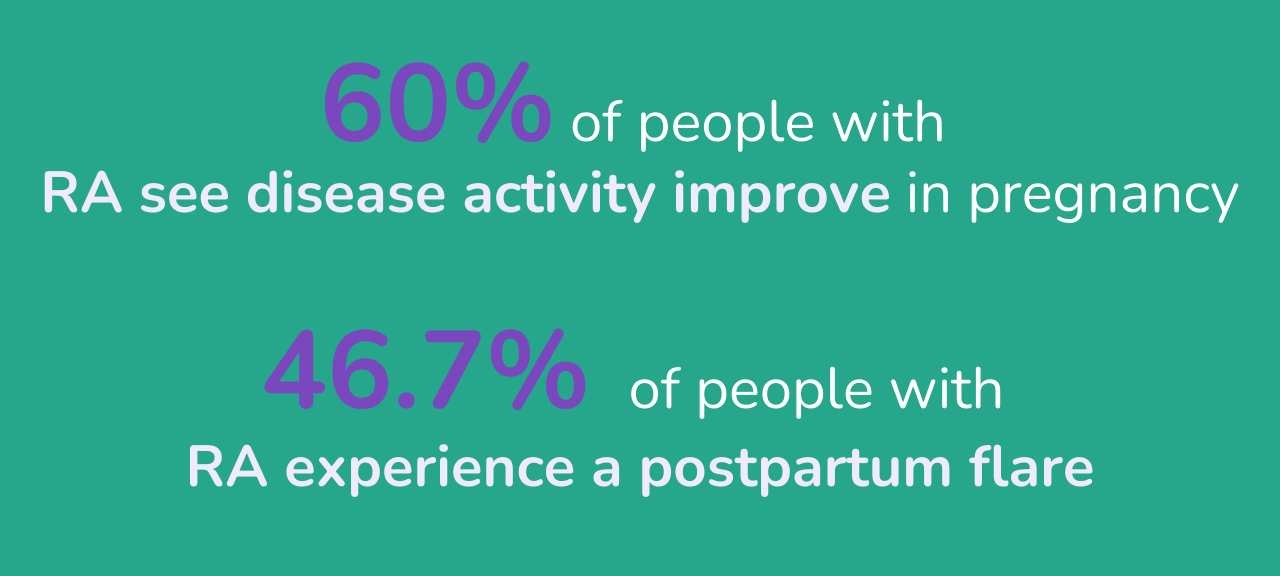Managing Rheumatoid Arthritis During Pregnancy and Breastfeeding
Disclaimer: This page houses important information and resources pertaining to rheumatoid arthritis during pregnancy and while breastfeeding, including links to our evidence-based Fact Sheets. However, the resources here should not replace the care and advice of a medical professional.
Rheumatoid arthritis (RA) is a kind of arthritis that causes joint pain, stiffness, swelling, and decreased range of motion. The small joints in the hands and feet are most frequently affected. It is an autoimmune condition, meaning the immune system doesn’t work the way it should and attacks the lining of the joints. Women are three times more likely than men to develop RA, and it most commonly begins between ages 30-60, so can impact a person’s childbearing years.

Reference: Jethwa et al., 2019
RA can cause complications in pregnancy, although if RA is well controlled for 3-6 months before becoming pregnant, the chance for complications tends to be lower than it is for people with more active RA. Untreated active RA increases the chance for complications such as preterm birth, preeclampsia (a pregnancy-related condition characterized by a dangerous rise in blood pressure and problems with kidney function), and low birth weight. Because pregnancies are more successful when RA is well controlled, staying on a medication that works for you is important for your health and the health of the pregnancy – but there are also some medications that should be avoided. Be sure to talk to your healthcare provider about all of your pregnancy and breastfeeding questions.
[People] who have uncontrolled rheumatoid arthritis may be at increased risk of complications such as preterm birth and babies that are small for their gestational age. This may increase the likelihood that the baby requires more medical care early in life.
— Arthritis Foundation
Join Our Rheumatoid Arthritis Study
If you’re pregnant and have RA, please consider enrolling into our observational study to give people better answers about how RA and its management can affect a pregnancy and a developing baby. You will not be asked to take or change any medications, and you can participate from the comfort of your home.
Please see our library of resources below on RA during pregnancy and breastfeeding.
Related Fact Sheets
- Abatacept (Orencia®)
- Adalimumab (Humira®)
- Azathioprine | 6-mercaptopurine
- Certolizumab Pegol (Cimzia®)
- Etanercept (Enbrel®)
- Hydroxychloroquine (Plaquenil®)
- Infliximab
- Leflunomide (Arava®)
- Methotrexate
- Prednisone | Prednisolone
- Pregnancy Study Participation
- Rheumatoid Arthritis
- Sarilumab (Kevzara®)
- Tocilizumab (Actemra®)
- Tofacitinib (Xeljanz®, Xeljanz XR®)
Related Baby Blogs
External Resources
- American College of Rheumatology: Pregnancy and Rheumatic Disease
- Arthritis Foundation: Rheumatoid Arthritis and Pregnancy
- Canadian Arthritis Patient Alliance: Pregnancy and Parenting with Arthritis: A Resource for Patients by Patients
Partners
- Arthritis Foundation
- Canadian Arthritis Patient Alliance
- Creaky Joints
- MyHealthTeams
- PatientsLikeMe
- Society for Maternal Fetal Medicine (SMFM)
- The Mighty
Stay in Touch
Our e-Newsletter brings you the latest information, news, and resources from the experts at MotherToBaby.
Join a Study
Expecting parents deserve better information about medication use in pregnancy and breastfeeding – and you can help by participating in a study.
Ask Our Experts
Call, text, chat, or email for a free personalized risk assessment on exposures in pregnancy and breastfeeding.

